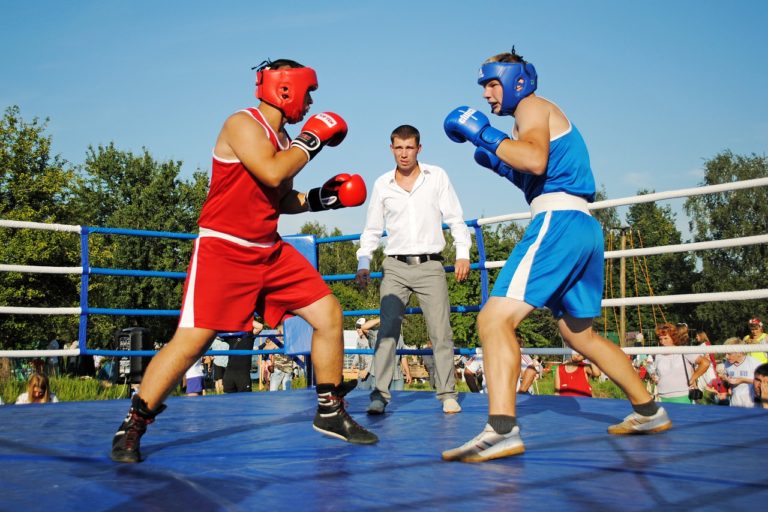Does Boxing make you Dumber?

There is a big stereotype surrounding boxers and their intellect, which I think is quite heavily built upon popular culture with movies like Rocky where he’s depicted as a bumbling bum who eats punches for a living. Perhaps the origins of western boxing are also partially to blame. Young men who didn’t have the opportunity and came from lower-class families would take up boxing as a sport or profession.
However, none of this answers the question of whether boxing actually makes you dumber, and technically it doesn’t but the implications of boxing long-term competitively very well may be detrimental to the boxer’s brain.
If you were to simply practice boxing, like hitting the pads, heavy-bag, and jump-rope, where head injury isn’t a risk, then it is perfectly safe and a great aerobic exercise. Whereas, if you were to compete in professional boxing and receive hundreds of hard blows to the head, there is a good chance of developing head injuries that could potentially affect your physical and/or cognitive abilities.
Does getting punched in the head make you dumber?
Blunt force to the head will have repercussions, according to the American Association of Neurological surgeons, 15-40 percent of former boxers show signs of chronic brain injury, and most professional boxers (even those who don’t show symptoms) have some degree of brain damage.
Ex-boxers often show varying degrees of cognitive impairment like memory loss and difficulty articulating their words. So there is a massive amount of evidence that proves that consecutive blows to the head will be detrimental to the brain.
We’ve seen in happen to legends in the sport like Ali, who despite his brilliant movement, suffered from many blows during his reign, which many attribute to being the reason he developed Parkinson’s disease later in his life.
On this table below there is some data showing the sports with the most head injuries:
| Sport | Number of head Injuries |
| Cycling/Biking | 85,00 |
| Football | 47,000 |
| Baseball/Softball | 38,500 |
| Basketball | 34,500 |
| Water Sports (Tubing, Skiing, Diving, Swimming, etc) | 28,500 |
| Recreational Vehicle Use (ATV, Go Karts, etc) | 26,500 |
| Soccer | 24,000 |
| Skateboards/Scooter | 23,000 |
| Health Club Activities/Fitness | 18,000 |
| Winter Sports – (Skiing, Sledding, Snowboarding) | 17,000 |
As you may have noticed, boxing is nowhere to be found on this list, which may be surprising for some because of the sport’s reputation. Now, it would be easy to assume that because boxing doesn’t appear on this list, it is safer to do than the sports above which just isn’t the case. Firstly, in order to contextualize it, we have to consider that most, if not all of these sports are performed on a much large scale than boxing hence why the injuries may be higher as a number but not as a percentage.
Secondly, a lot of boxing head injuries are cumulative, meaning they developed over time so its difficult to trace the injury back to a specific fight or punch which is why they often won’t be recorded as a head injury.
To conclude, if you box long term, there is a very good chance that you will experience some sort of head or brain-related injury which may impair your cognitive abilities.
So are boxers dumb?
I can’t speak on behalf of the boxing community and all current boxers but It would definitely be insulting to call all fighters stupid. Sure in any industry you’ll find people with varying levels of IQ but boxers on a whole aren’t dumb. A lot of people make the assumption that boxing is a tough man’s sport and to a degree that is true, you can get a long way with just sheer power but you’ll generally find that the great fighters are thinkers, not brawlers.
Most elite fighters are able to stay calm amid the chaos, step back, and adjust to the situation. Take, for instance, boxing legend Floyd Mayweather. He competed at the highest level for the better part of 2 decades, and during that time he faced hard punchers like Canelo Alvarez and fast punchers like Zab Judah. While these fighters physically had him beat, his boxing IQ, strategic positioning, and relentless worth ethic allowed him to put on masterful performances, making many of his great opponents look amateur and un-coordinated.
This is just one example of when the smarter fighter is able to prove that boxing isn’t just a physical sport. Sure, physicality is part of it, you have to put the work in at the gym, train hard, eat well, and get rest but your mental prowess will be displayed when you face a strategic puncher or someone you can’t overwhelm with power and speed.
Some people may argue that the notion of stepping into a ring to fight with a man you may not have any personal issue with is completely stupid within itself which is a completely reasonable assessment of the situation and I have no definitive answer to counter this argument because in many cases the risk to reward factor in boxing isn’t worth it. However, many fighters fight because that’s all they know and boxing is their passion, so when someone really loves their sport, it’s difficult to bring reasons to why they shouldn’t do it.
Does training make you dumber?
Hard sparring will have similar effects to actually fighting, so developing brain injury from this kind of training is possible. However, light sparring, where technical movements are much more the emphasis than brawling is safer, it does involve being hit lightly, which still is never advisable but the risk is significantly less than if you were to spar hard or fight.
Heavy bag training, mitts, jump rope, and the speed bag will have no impact on your cognitive ability as they are only boxing-derived exercises and don’t actually involve any physical contact with the head. This is why boxing training is recommended by many personal trainers as its a great aerobic exercise that is very physically demanding and forces your body to move differently and adapt to intense training.
This usually would be quite obvious, but with the massive stigma surrounding boxing and brain damage, its important to make clear what elements of boxing involve risk.
Best exercises for boxing that don’t involve head punches
Body Sparring – Body sparring is a great way to practice your boxing without hurting yourself or your sparring partner providing that you use limited power (body shots can be just as dangerous as head blows with power). This way you can enjoy the feeling of boxing without incurring the risk. However, it is imperative that power is kept minimal to limit any chance of injury and it also allows both boxers to improve their technique.
Hitting the heavy bag – Heavy bag training allows you to practice all kinds of punches on a still object, the purpose of this exercise is to improve technique, cardiovascular endurance, and explosiveness. Hitting the bag too hard or for too long may lead to hand injuries but it won’t put your brain in danger.
Pad work – Pad work is another excellent way to practice boxing, it allows you to manage distance with your target, move in various angles, and is a personal favorite. I’ve noticed that pad work, second to sparring has been what has helped most new boxers improve on their skills.






